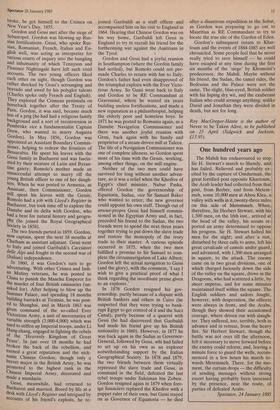One hundred years ago
The Mandi has endeavoured to stop Sir H. Stewart's march to Shendy, and has failed. Relieved and probably ex- cited by the capture of Omdurman, the great fortified post opposite Khartoum, the Arab leader had collected from that post, from Berber, and from Metem- meh, some 10,000 men at Abou Klea, a valley with wells in it,twenty-three miles on this side of Metemmeh. When, therefore, Sir Herbert Stewart, with his 1,500 men, on the 16th inst., arrived at the head of the valley, his scouts re- ported an army determined to oppose his progress. Sir H. Stewart halted his men for the night; and after 'a rest, disturbed by three calls to arms, left his great cavalcade of camels under guard, and advanced, with 1,300 men arranged in square, to the attack. The enemy. came on in two great divisions, one of which charged furiously down the side of the valley on the square, drove in the Dragoons, who had scattered a little, by sheer impetus, and for some minutes maintained itself within the square. The English soldiers and sailors fought, however, with desperation, the officers were always in front, and the Arabs, though they showed their accustomed courage, where driven out with slaugh- ter. They suffered, too, terribly, both in advance and in retreat, from the heavy fire. Sir Herbert Stewart, though the battle was not over till the afternoon, felt it necessary to move forward before the enemy could reform; and, leaving a minute force to guard the wells, recom- menced in a few hours his march to- wards Metemmeh. There, for the mo- ment, the curtain drops — the difficulty of sending messages without strong escort having probably been increased by the presence, near the route, of parties of defeated Arabs.
Spectator, 24 January 1885










































 Previous page
Previous page